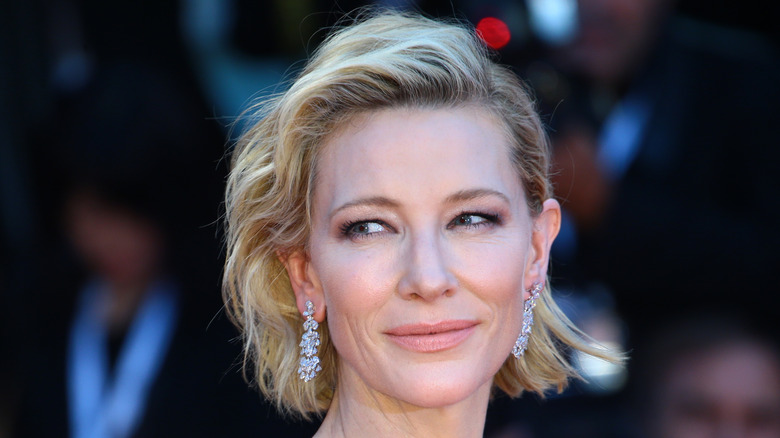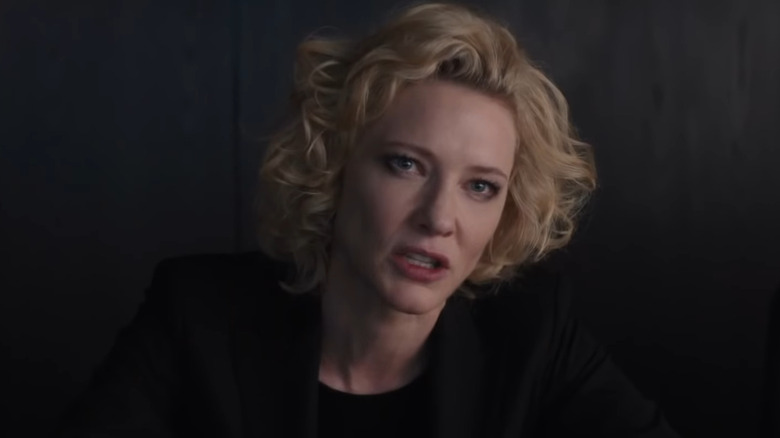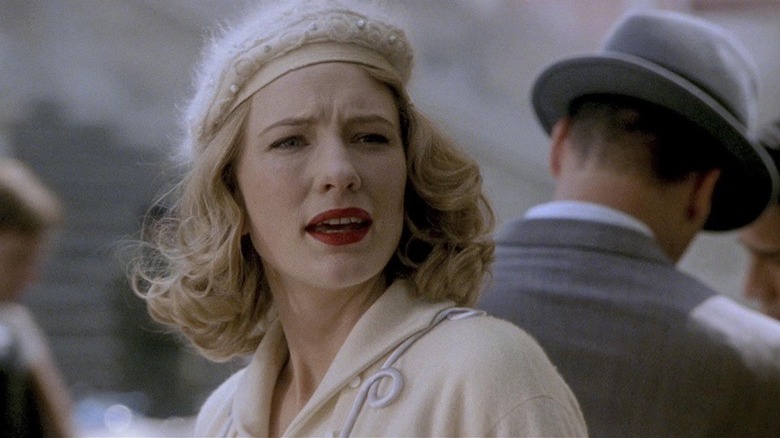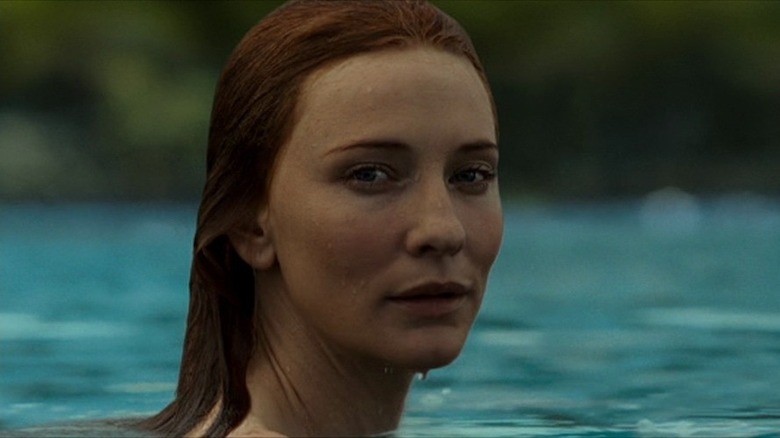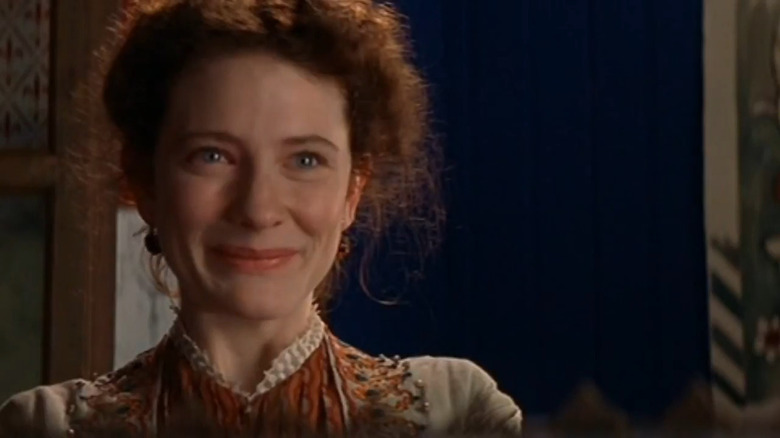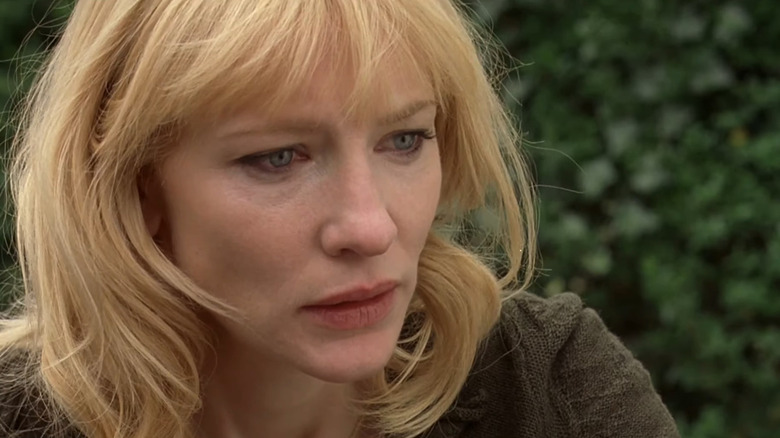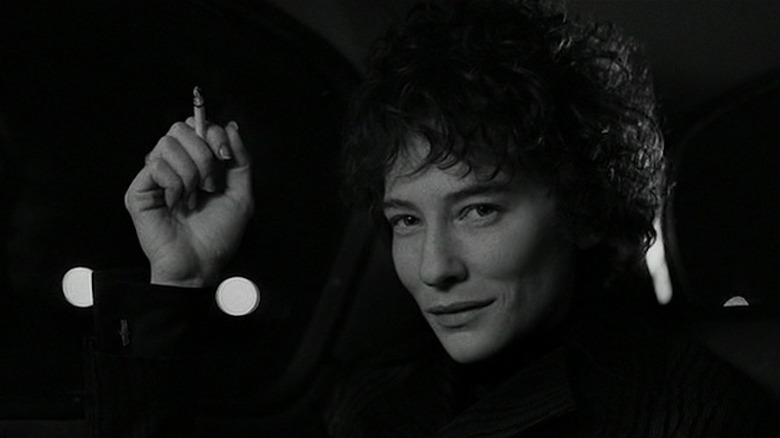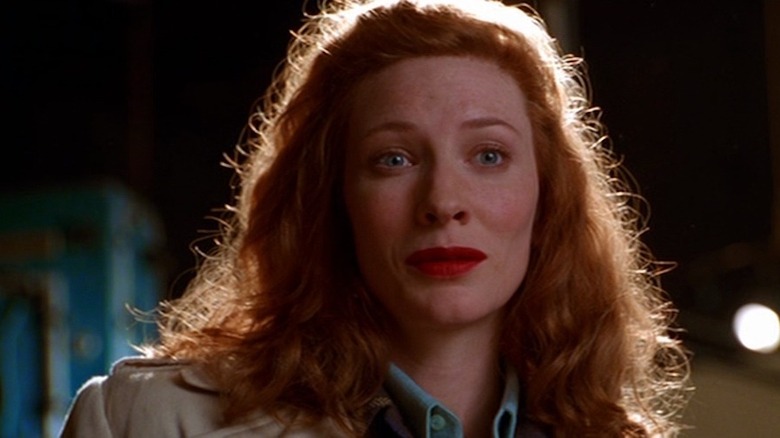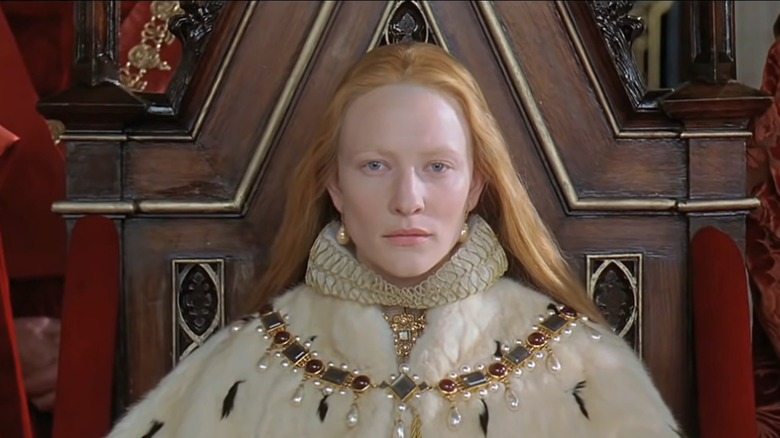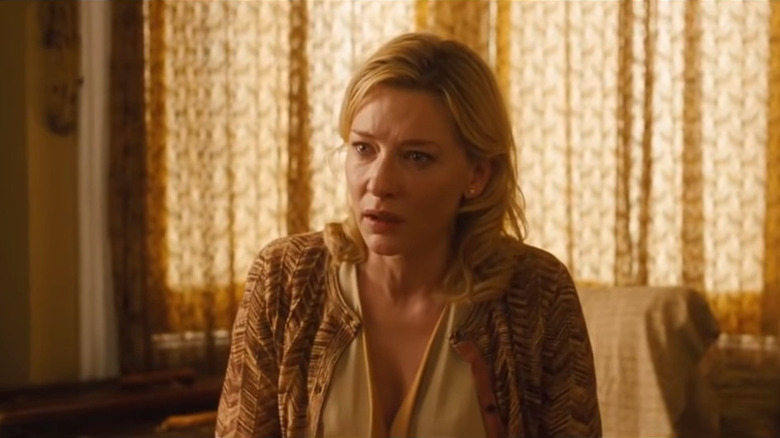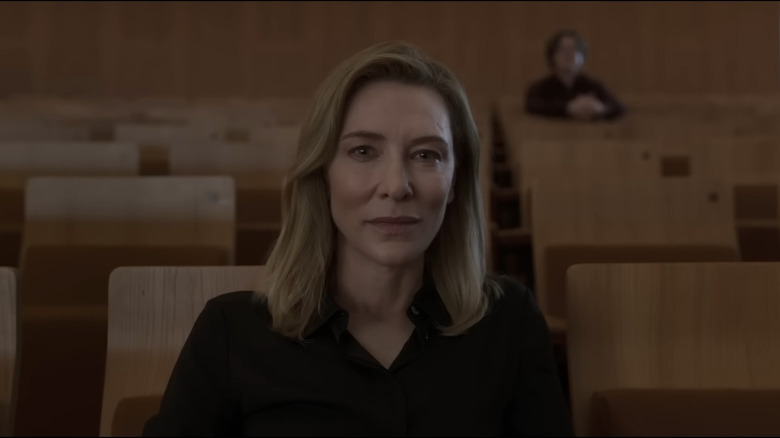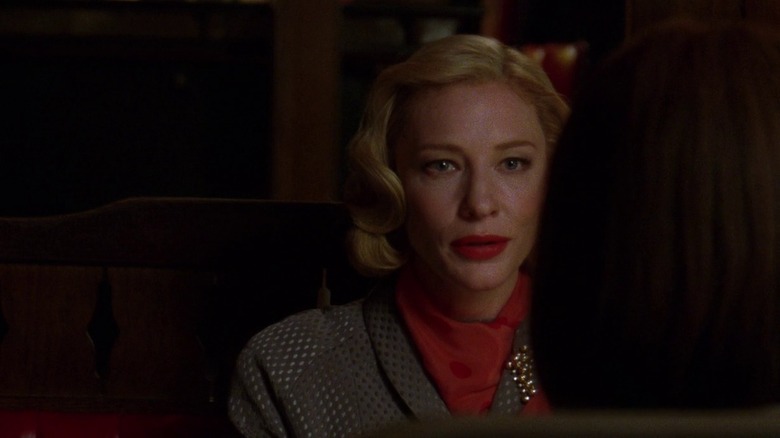Cate Blanchett's 12 Best Performances Ranked
There are few contemporary actors who are as consistently astounding as Cate Blanchett, who never fails to give a performance that will make the hairs on your arms stand up. Whether it be in a Marvel movie or a serious arthouse flick, Blanchett delivers the kind of performances that are hard to forget. Because she has so routinely delivered impressive work, you'd be hard-pressed to find a moviegoer who doesn't respect her as an artist. You don't have to be a film critic or a trained actor to understand the kind of power she brings to the screen.
Because the celebrity machine is what it is, some actors are beloved as much for their off-screen antics as they are for their actual acting. For Blanchett, the proof is very much in the pudding. Though she's certainly a charming person when she engages with the press, you need only watch a few minutes of a Cate Blanchett performance to see that the accolades she has received are well-deserved. Though Blanchett is a totally embodied, no-holds-barred actor, she has the unique ability to make you believe that she's always holding something back, that there's more to her characters than meets the eye.
We would love to spend all day dissecting every single one of Blanchett's performances, but we haven't the time. Instead, we thought we'd create a highlight reel of sorts, spotlighting the very best work of a truly prolific artist. Keep reading to dig into Cate Blanchett's 12 best performances.
12. Truth
"Truth" is probably one of Cate Blanchett's least-seen performances, but it's worth mentioning here. Blanchett plays Mary Mapes, a "60 Minutes" producer who produces a report on George W. Bush's military record. She stars alongside Robert Redford, who plays CBS anchor Dan Rathers. The film received somewhat middling reviews, but Blanchett's performance is typically impressive (via Rotten Tomatoes).
Blanchett is an actress who knows how to take big swings and make her characters utterly captivating. One of the things that's most interesting about her portrayal of Mary Mapes is how relatively average she is. Mapes certainly comes off as a strong and determined woman here, but she's not flashy or grandiose or in any way interested in being in the spotlight. This creates an interesting challenge for Blanchett, who, rather than making Mapes electric or alluring, must embody an unusual sense of normalcy.
Blanchett imbues Mapes with a deep-seated sense of dignity, bringing to life a complex character who is much more interesting than she might appear on the page. Rather than have Mapes be a larger-than-life heroic figure, Blanchett plays her with a sense of realism. While her climactic moments are certainly effective, what's so impressive about Blanchett's performance here is how the actress disappears into the role, leaving only the woman in her wake.
11. The Talented Mr. Ripley
"The Talented Mr. Ripley" is a beautiful movie. Its subject matter is not altogether pleasant, to be fair, but it's filled with beautiful people in beautiful locations acting in the most beautiful manner. One such beautiful person is Cate Blanchett, who plays Meredith Logue, an American socialite who has the misfortune of meeting the sociopathic Tom Ripley (Matt Damon). Blanchett may not have a central role in the film, but she exudes such charisma and grace that it's impossible to tear your eyes away from her when she's on screen.
In many ways, "The Talented Mr. Ripley" is an example of what Blanchett can do with very little. We don't know much about Meredith — apart from the fact that she's rich and beautiful — but she's positively dazzling every time we encounter her. It's rare for a Blanchett character to not be driving the action in some way, but Meredith's relative (though not absolute) immateriality to the plot doesn't make her any less compelling.
Indeed, it's interesting to watch what Blanchett does when handed a character who isn't outsmarting or out-charming everyone around her. Blanchett is able to give Meredith just enough mystery that we suspect she's not as vapid as she looks, but not too much mystery that she winds up derailing the whole film. (Though we would certainly watch another movie focused solely on Meredith's exploits.)
10. The Curious Case of Benjamin Button
Cate Blanchett is no stranger to the romantic drama, and her first real foray into the genre was with 2008's "The Curious Case of Benjamin Button." The David Fincher epic stars Brad Pitt as the titular character, who was born as an old man and ages backward for the rest of his life. The most important person in Benjamin's life is Daisy (Blanchett), a dancer who he meets as a young girl.
Blanchett is a wonderfully physical actor, and she gets to express this quality beautifully in her portrayal of Daisy. A dancer and the definition of a Southern Belle, Daisy possesses all the grace and elegance you would expect from such a person. Though Benjamin is the central character of the film, it's Daisy's journey of getting older and recovering from the accident that derails her career that's the most compelling element of the film.
Daisy is someone who is both free-spirited and grounded, and her palpable desire for something greater than what she can ever truly possess is made devastatingly real by Blanchett. At its core, "Benjamin Button" is a tragic love story, as Benjamin and Daisy are forever moving in opposite directions and will never get to experience the type of settledness that other couples do. Blanchett plays this undercurrent of despondence beautifully, and the magical, almost intangible quality she has in the film lends itself perfectly to the otherworldly subject matter.
9. Oscar and Lucinda
1997's "Oscar and Lucinda" was the first of Cate Blanchett's movies to be released in the United States, and it's clear why her career began to take off after its release. Directed by Australian filmmaker Gillian Armstrong, who earlier in the decade helmed "Little Women," the film is an adaptation of the Peter Carey novel of the same name. Blanchett plays Lucinda, an Australian heiress with an obsession with glass and a passion for gambling. Lucinda meets Oscar (Ralph Fiennes), an Anglican minister with whom she forms a unique bond.
Fiennes was a bonafide star in the late '90s, but Blanchett has no problem holding her own with — and in some cases, pulling our attention away from — the heartthrob. She possesses many of the qualities we've come to know her for: cheeky wit, willful determination, and a casual disregard for so-called social norms. The film itself is fairly restrained, but Blanchett takes every opportunity she can to make herself larger and more brilliant in the face of such moderation.
Blanchett is almost too powerful for such a quaint film, and it's no wonder she would go on to do even grander things. It was actually her role in "Oscar and Lucinda" that led her to be cast in "Elizabeth," the film that would skyrocket her to international fame (via The Independent).
8. Manifesto
It just wouldn't be fair if we didn't include "Manifesto" on this list, as it's the film where Cate Blanchett plays 13 wildly different characters, all of whom recite monologues inspired by famous manifestos from the 20th century. Unforutany, not many people have actually seen the movie, so we'll do our best to enlighten you. "Manifesto" initially premiered as a multi-screen art installation that took approximately two hours to view in its entirety. Director Julian Rosefeldt then created a 90-minute theatrical version that premiered at Sundance.
It's often said that Blanchett has the ability to completely transform herself for a role, and this skill is as clear as it's ever been in "Manifesto." The characters that Blanchett plays in the film include diverse figures such as a school teacher, factory worker, choreographer, punk, newsreader, scientist, and puppeteer. More of an artistic experiment than a cohesive film, "Manifesto" gives Blanchett the chance to play and act as flamboyant as she wishes. Her performances here certainly aren't nuanced, but they are larger-than-life in a way that's well-suited to the film's unique format.
It's a delight to watch Blanchett be given the freedom to totally let loose and be playful. While she is certainly able to transform herself for each role, the actual process of acting is made clear here in a way that wouldn't be welcome in another project. But because "Manifesto" is about experimentation and expression, Blanchett's full-throttled approach isn't just welcome, it also gives us insight into just how far an actor like Blanchett can go.
7. Notes On a Scandal
If you're an actor lacking confidence or magnetism, Cate Blanchett is not someone you want to act alongside. Luckily, that situation is far from the case in 2005's "Notes on a Scandal," which pits Blanchett against the indomitable Judi Dench. Dench plays Barbara, a veteran history teacher at a school in London. Filled with both a deep-seated resentment and a voracious sense of loneliness, Barbara befriends Sheba (Blanchett), a new art teacher who she learns is having an affair with a student. Barbara uses this secret to manipulate Sheba until it blows up in both of their faces.
While the film's subject matter is rather sensational, Dench and Blanchett are so exceptional that it never becomes gaudy or overdrawn. While it's not without melodrama, the two actresses deliver a masterclass in grounded power, never straying too far from the truth of the matter despite the lurid circumstances. Dench and Blanchett play against each other like stray cats, tip-toeing around and sussing each other out while waiting for the right moment to strike.
The tension is palpable, and Sheba's quickly eroding sanity and sense of hope are magnificently played out by Blanchett. Though Dench's character is certainly painted as the villain in the film, Blanchett's Sheba is in some ways equally as dark, and Blanchett allows that fact to slowly creep up on us until the dam finally breaks.
6. I'm Not There
Todd Haynes' Bob Dylan "biopic" may not be a total home run, but it does have at least one thing going for it: Cate Blanchett's brilliant portrayal of the rebel himself. Blanchett has proven herself to be a magnificent impressionist, and this characteristic is clearly on display here. One could argue that impressions aren't the highest form of acting, but Blanchett might just prove you wrong.
Todd Haynes' unusual biopic has six different actors portray Dylan over the course of his life, and Blanchett's is by far the best of the bunch. She plays him during his "Don't Look Back Era," all scruffy hair and rock 'n' roll attitude. From a purely comparative standpoint, Blanchett's impression of Dylan is amazingly spot-on. She embodies his unique mannerisms and speaking patterns perfectly, and it's kind of hard to wrap your brain around the fact that it's Cate Blanchett under all that devil-may-care swagger.
But Blanchett as Dylan is more than just an impression — it's a full-bodied possession. She makes Dylan feel real, rather than simply a caricature of a man, while also finding the humor in the role. Blanchett rightly earned a nomination for best supporting actress at the Oscars that year, becoming one of only a few actors to have earned two acting nominations (the other was for "Elizabeth: The Golden Age") in the same year (via The Wrap).
5. The Aviator
Cate Blanchett has played three iconic historical figures in her career: Queen Elizabeth I, Bob Dylan, and Katherine Hepburn. Each one of these performances is excellent, and they're all distinct in their approach to the subject at hand. In Martin Scorsese's 2005 epic "The Aviator," Blanchett plays Katherine Hepburn, one of several leading ladies who Howard Hughes (Leonardo DiCaprio) has a fondness for.
Blanchett is the only actress to have ever portrayed Hepburn, who was known as much for her beauty as she was for her unique quirks and dynamic personality. Hepburn and Hughes didn't actually last all that long in real life, but it's one of the film's most central components. Playing an iconic figure like Hepburn — who actually died the day Blanchett started filming, per The New York Times — couldn't have been an easy task, but Blanchett embodies the late actress in such a way that makes us feel silly for ever having worried about the outcome.
She's as ethereal and mysterious as Hepburn always seemed to be, but Blanchett also imbues her with a sense of heart and grounded energy that she never feels irredeemably larger-than-life. While a Hepburn impression could easily land itself in grandiose territory, Blanchett never takes it there, portraying Hepburn with a subtlety that leaves us forever wanting more. It's truly devastating every time she leaves the screen, which makes it all the more believable that DiCaprio's Hughes could never get over their breakup. Blanchett is not a greedy actor, but she tends to rest our attention away from the film's leading man, leading to her first Oscar for best supporting actress (via IMDb).
4. Elizabeth and Elizabeth: The Golden Age
There was before "Elizabeth," and then there was after "Elizabeth." Before "Elizabeth," Cate Blanchett was simply another working Australian actress, but afterward, she was a force to be reckoned with. Playing one of our most well-known historical figures is no small task, but Blanchett inhabits the role like it was written for her to begin with. In Blanchett's hands, Elizabeth becomes a compelling contradiction: a woman with far-reaching power and political acumen, and also someone who longs for love and companionship.
A figure like Elizabeth could easily feel unknowable, but Blanchett allows us to see how this woman was forged and how she holds herself together. She's still powerful and commanding, but we get the sense that this power is something she's had to build up within herself over time. It's also thrilling to watch her wield that power that she never asked for but is so clearly capable of exerting. Blanchett's Elizabeth is at once prickly and soft, daring and uncertain.
Blanchett's portrayal of Elizabeth is undoubtedly the best portrayal of the virgin queen to have ever been captured on screen, and she was rightly nominated for best actress for her role in the 1998 film and its 2007 sequel (via IMDb). Interestingly enough, the 1999 Oscars actually bestowed Judi Dench a best supporting actress award for her portrayal of the queen in "Shakespeare In Love," and Blanchett didn't win the Oscar for either film.
3. Blue Jasmine
Cate Blanchett has a knack for playing women who find themselves unraveling, and no film better illustrates her expertise than Woody Allen's 2013 film "Blue Jasmine." Blanchett plays the titular character, a New York Socialite who moves in with her less well-off sister (Sally Hawkins) in San Francisco after her marriage falls apart. Like most of Allen's protagonists, Jasmine is hard to love, and even harder to like. She's mean-spirited, rude, stuck-up, and seems to have a disdain for those around her (but perhaps most of all, herself.)
But, despite the fact that Jasmine has very few redeeming qualities, Blanchett plays her so tragically that it's impossible to avert your eyes, even when you want to. Blanchett isn't trying to get you to love Jasmine, per se, but she does all that she can (and in the end, succeeds) to make you understand her. Jasmine is a woman fighting against the tide, suffocating because of her own refusal to adapt to her new circumstances. Nothing about Jasmine's behavior is pretty, but Blanchett's explosive, eviscerating performance is awe-inspiring, something akin to watching a tornado destroy everything in its wake.
Blanchett went on to receive her first best actress Oscar for the performance, going up against a stacked lineup that included Amy Adams, Meryl Streep, and Judi Dench (via IMDb).
2. Tár
If you watched "Tár" and thought "Wow, it seems like this role was made for Cate Blanchett," you'd actually be right. Filmmaker Todd Field has said that he wrote the part specifically for Blanchett and that if she had said no, the film wouldn't have been made (via The Film Stage). It's easy to see why Field felt this way. Blanchett seems to inhabit the role of Lydia Tár at a cellular level. She has always been an actor that is extremely skilled at transforming her mannerisms and bodily comportment for a part, and this has never been more true than in "Tár."
A part of this is Blanchett's astounding portrayal of Lydia Tár's conducting work. The way her body moves when she conducts is spellbinding, and you can almost feel the ecstatic passion coursing through her veins as she leads the symphony. Lydia Tár is just as compelling off-stage. She has an aloof way about her, an attitude that certainly contributes to the ease with which she mistreats her colleagues. Lydia Tár is not an especially likable character, but Blanchett's performance makes it obvious why those around her might be willing to overlook her disgraceful behavior.
Blanchett has played pompous characters like this before, but none have been as deceptively volcanic as this. Blanchett makes the great Lydia Tár totally vulnerable, but not so that we will root for her. Instead, Lydia's still-beating humanity makes her all the more excruciating to watch.
1. Carol
Cate Blanchett has taken a lot of big swings over the years. She's never been the kind of actor who backs down from brazen excellence, and her awe-inspiring talent is hard to miss. But sometimes, the best performances are the kind that sneak up on us, the kind that aren't flashy or obvious, but instead, simmer just underneath the surface. For Cate Blanchett, that performance is her title role in the Todd Haynes film "Carol."
Blanchett plays a lonely housewife who falls in love with a young saleswoman she meets while Christmas shopping. "Carol" is a beautiful film in every sense of the word, but it is Blanchett's performance that makes it truly brilliant. On the surface, Carol comes off as a reserved, sometimes cold woman. But when Blanchett embodies Carol, something happens. When she peels back the layers, even just for a moment, we see the real Carol. Someone who is lost, lonely, and insecure. As she tells Therese (Rooney Mara) on the phone one night, she just wants to be asked things.
For a 1950s housewife like Carol, appearances are everything. But what Blanchett does is bring us into Carol's emotional world, even if we only get to see her true feelings through something as simple as a glance or a touch on the shoulder. It's a wonderfully subtle and nuanced performance, and even in her more dramatic moments — such as when negotiating with her husband — the struggle to maintain her dignity is written all over her face. It's equal parts devastating and hopeful, and it simply can't be topped.
